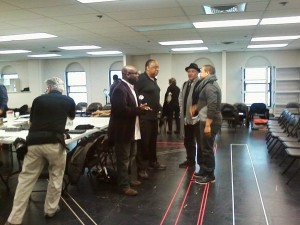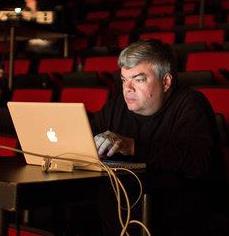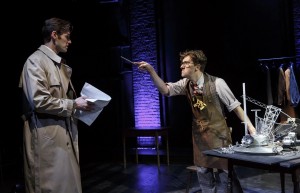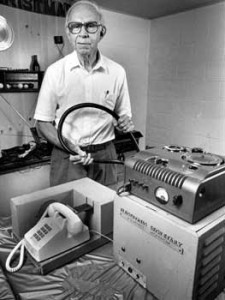 The first rehearsal for the Chicago premiere of Satchmo at the Waldorf went exhilaratingly well. Barry Shabaka Henley, whom I met for the first time yesterday morning, proved to be both a first-rate actor and an unusually nice man. (He’s the tall guy at left.) Judging by what happened in the Court Theatre’s rehearsal hall on Tuesday, Barry is already well on the way to putting his personal stamp on Satchmo, just as Dennis Neal and John Douglas Thompson did before him. What happens in the rehearsal room stays in the rehearsal room, so I don’t want to be any more specific than that. Suffice it to say that he read the whole show out loud for the production team and a small audience of invited guests, and—as we say in the business—he killed.
The first rehearsal for the Chicago premiere of Satchmo at the Waldorf went exhilaratingly well. Barry Shabaka Henley, whom I met for the first time yesterday morning, proved to be both a first-rate actor and an unusually nice man. (He’s the tall guy at left.) Judging by what happened in the Court Theatre’s rehearsal hall on Tuesday, Barry is already well on the way to putting his personal stamp on Satchmo, just as Dennis Neal and John Douglas Thompson did before him. What happens in the rehearsal room stays in the rehearsal room, so I don’t want to be any more specific than that. Suffice it to say that he read the whole show out loud for the production team and a small audience of invited guests, and—as we say in the business—he killed.
 I also got a look at the finished model for John Culbert’s set, which is already under construction on the stage of the Court. Of course I’d seen photographs of earlier versions, but standing in front of the model for the first time is always a thrill, and I couldn’t be more pleased.
I also got a look at the finished model for John Culbert’s set, which is already under construction on the stage of the Court. Of course I’d seen photographs of earlier versions, but standing in front of the model for the first time is always a thrill, and I couldn’t be more pleased.
No guests today. Instead, we roll up our sleeves and get down to business. Charlie Newell, the director, has strongly and excitingly individual ideas about Satchmo, and that, as I told him when we first discussed the production several months ago, is exactly what I have in mind. I don’t want a replica of any of the play’s previous productions, wonderful though they were. I want Charlie to do it his way, and he knows I mean it.
Don’t expect to hear too much more from me for the next few days. We have a lot to do between now and the first preview on January 7. Rehearsing a play is hard work—but it’s also as much fun as anything I know. That’s why they call it a play.



 A few minutes from now I’ll leave Our Girl’s apartment in Chicago and walk two blocks to the rehearsal hall where Barry Shabaka Henley, Charles Newell, and I start work later this morning on the Court Theatre’s
A few minutes from now I’ll leave Our Girl’s apartment in Chicago and walk two blocks to the rehearsal hall where Barry Shabaka Henley, Charles Newell, and I start work later this morning on the Court Theatre’s  Bedlam specializes in radically original small-scale classical revivals but thrives on the unexpected. So instead of Shakespeare or Shaw, its latest production is…a musical! Truth to tell, “New York Animals,” a play by Steven Sater (“Spring Awakening”) with songs by Mr. Sater and Burt Bacharach (yes, that Burt Bacharach), doesn’t quite fill the bill, but it comes close, and Eric Tucker, Bedlam’s artistic director and resident wizard, has mounted it with his accustomed flair and resourcefulness. While the show itself has some problems, the production has none at all. It’s a miracle of frugal ingenuity, the kind of mega-ingenious zero-budget staging that makes you wonder why Broadway even bothers.
Bedlam specializes in radically original small-scale classical revivals but thrives on the unexpected. So instead of Shakespeare or Shaw, its latest production is…a musical! Truth to tell, “New York Animals,” a play by Steven Sater (“Spring Awakening”) with songs by Mr. Sater and Burt Bacharach (yes, that Burt Bacharach), doesn’t quite fill the bill, but it comes close, and Eric Tucker, Bedlam’s artistic director and resident wizard, has mounted it with his accustomed flair and resourcefulness. While the show itself has some problems, the production has none at all. It’s a miracle of frugal ingenuity, the kind of mega-ingenious zero-budget staging that makes you wonder why Broadway even bothers. Tell me what you laugh at and I’ll tell you how old you are. No art form is more sensitive to generational cross-currents than comedy—but nowadays American theater is increasingly in thrall to the comfy needs of 50-plus playgoers. So it’s a heartening surprise to see the Manhattan Theatre Club, most of whose subscribers appear to measure up, putting on a charming farce called “Important Hats of the Twentieth Century” that feels more like a zany cable-TV sitcom episode than an old-fashioned stage comedy.
Tell me what you laugh at and I’ll tell you how old you are. No art form is more sensitive to generational cross-currents than comedy—but nowadays American theater is increasingly in thrall to the comfy needs of 50-plus playgoers. So it’s a heartening surprise to see the Manhattan Theatre Club, most of whose subscribers appear to measure up, putting on a charming farce called “Important Hats of the Twentieth Century” that feels more like a zany cable-TV sitcom episode than an old-fashioned stage comedy.
 I
I  Mrs. T and I were chatting about that post the other day, and we got to wondering what subsequent invention had had the biggest effect on our own everyday lives. She plumped for the GPS, and after a bit of thought I found myself agreeing with her. Yes, the iPod was a big deal, but I still have no trouble imagining life without a portable record library, which would be less convenient but by no means impossible. (Remember terrestrial radio?) By now, though, I really do find it hard to imagine how I ever got along without a GPS. Given the amount of traveling I do, it has long since become almost as essential to my present-day existence as word processing.
Mrs. T and I were chatting about that post the other day, and we got to wondering what subsequent invention had had the biggest effect on our own everyday lives. She plumped for the GPS, and after a bit of thought I found myself agreeing with her. Yes, the iPod was a big deal, but I still have no trouble imagining life without a portable record library, which would be less convenient but by no means impossible. (Remember terrestrial radio?) By now, though, I really do find it hard to imagine how I ever got along without a GPS. Given the amount of traveling I do, it has long since become almost as essential to my present-day existence as word processing. That’s not me, not quite, but there are times when it looks too much like me for comfort, and I wouldn’t dream of trying to blame it on Miranda, any more than I take it personally on the rare occasions when she steers me wrong. No, I’m the problem, with modernity my unindicted co-conspirator, though “labor-saving” gadgets like the GPS and—yes—my trusty laptop don’t help.
That’s not me, not quite, but there are times when it looks too much like me for comfort, and I wouldn’t dream of trying to blame it on Miranda, any more than I take it personally on the rare occasions when she steers me wrong. No, I’m the problem, with modernity my unindicted co-conspirator, though “labor-saving” gadgets like the GPS and—yes—my trusty laptop don’t help.